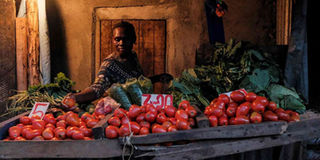Consider transforming lives via simple, low-cost interventions

A woman makes a selection of the most expensive tomatoes for a customer just before the 7pm curfew in Kibera, Nairobi on May 05, 2020. PHOTO | KABIR DHANJI | AFP
What you need to know:
- Physical infrastructure and real estate could be the rare bright spots.
- A well-thought out economic empowerment programme for hundreds of Lake Turkana fishermen could organise them into a vibrant cooperative society.
Those responsible for squandering our opportunities and resources have begun rearranging seats on a sinking Titanic. Having mismanaged the economy, the same characters are now focused on succession politics. Occasional handouts of food and face masks aside, Kenyans will have to endure economic pain without meaningful public support.
The government has struggled to paint a positive outlook and convince everyone that we are on a sound economic trajectory yet overwhelming evidence to the contrary is hard to miss. Critical data, such as year-on-year GDP growth rates, need to be scrutinised lest someone feed us concocted nonsense.
In its simplest form, if GDP growth rate for 2019 was five per cent, that implies the country produced five per cent more than in 2018. But the inflow of capital — illicit or otherwise — could and often give a false reading.
REPAYING DEBT
An external loan of $5 billion (Sh500 billion) and an inflow of $2 billion (Sh200 billion) through money laundering could increase GDP by a combination of the two even when actual growth may be negative. And once we begin repaying debt, the economy could, theoretically, shrink. It is, thus, feasible that there has been no growth and GDP figures could be inflated by the billions of dollars we have been borrowing. This could also explain our absurd jobless growth.
Given its magnitude, the agricultural sector ought to be a key contributor to the reported growth. Sadly, we know cheap imports, rising production costs and climate change have contributed to low productivity and falling real incomes.
There is little use of machinery in a sector where irrigation schemes collapsed. Cotton, pyrethrum, and sunflower are no longer grown. Dairy farmers have seen milk prices fall since Kibaki years. Farmers rue low profitability in growing cane, wheat, and maize. Agriculture could be experiencing the largest stagnation or attrition.
Physical infrastructure and real estate could be the rare bright spots. Anecdotally, graft may have fuelled the collapsing luxury spending on vanity projects, large shopping malls and office complexes, local and international tourism and mushrooming elite academies, beach homes and resorts. With tight liquidity and zero real growth, problems has begun.
At the outset, President Uhuru Kenyatta appeared keen on alleviating supply-side constraints through laudable initiatives like “The Last Mile” electricity project, prioritisation of technical and vocational education and training (TVETs), improved coordination of Northern Corridor transit transport, transfer of public services to electronic platforms and upgrade of road networks.
ELEMENTARY INTERVENTIONS
The elementary interventions have since been replaced by costly initiatives with dubious economic benefits. That aside, there exist opportunities where simple, commonsense interventions could sustainably improve lives with a direct and observable impact to real GDP.
A well-thought out economic empowerment programme for hundreds of Lake Turkana fishermen could organise them into a vibrant cooperative society and enable them to distribute their naturally salted fresh and dried fish at better prices even internationally. The county leadership could be supported to leverage the presence of the lake, low cost of production and marginal productivity of capital and technology to create jobs.
In Kerio Valley, a government-backed marketing and distribution programme could yield tremendous benefits to farmers and vendors of fresh fruits.
And littoral counties of Mombasa, Kwale and Kilifi could create thousands of jobs through a self-sustaining deep-sea fishing programme that would supply a steady stock of cheap and affordable sea food.
We must question the effectiveness of millions of dollars spent in these marginalised counties by the government and NGOs ostensibly to alleviate poverty and foster sustainable livelihoods. Until we are address pretence and corruption, and embrace practical interventions, GDP figures will remain meaningless and hollow.
Mr Chesoli is a New York-based development economist and global policy expert. [email protected] @kenchesoli





